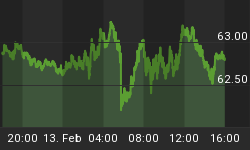The debate in precious metal markets today is whether or not the three-year bear market is over and a new uptrend is establishing itself. But assuming for a moment that the gold price has turned the corner, will the bullion banks be able to keep a lid on it? Given the recent jump in their short positions as recorded in the Bank Participation Report on Comex, they presumably think so, and unallocated accounts in London will play an important role.
With an unallocated account the customer doesn't have an entitlement to any specific bullion bars, and is a creditor of the bullion bank. So long as the customer is happy with the counterparty risk, this is the cheapest way for him to have exposure to gold. From the bank's point of view, there is no need to hold more gold than required to meet customer withdrawals. Furthermore, even this gold doesn't have to be bought, merely leased from a central bank, remaining in the Bank of England's vault unless needed. There can be little doubt that the increase in the quantity of gold held in the Bank's vaults between 2006 and 2013 reflected, among other factors, physical backing for increasing unallocated accounts during the 2000-2012 bull market.
In the past a bullion bank's risk to a rising gold price either went unhedged, or was managed through derivatives, using forwards futures and options. Therefore, so long as systemic risk is not regarded as a material factor, the bullion banking community can absorb significant gold demand from investors by expanding unallocated accounts without any physical buying required. However, the investing public's greater awareness of risk to bank deposits from bail-ins could change this in future. And it was only this week that wealthy German citizens were reminded of deposit risk when its government approved the introduction of bail-in procedures for bank insolvencies.
Increasing awareness of systemic risk by the rich and ultra-rich is likely to lead to a preference for allocated accounts or for vaulted gold held outside the banking system, over unallocated accounts. This being the case, the gold price is likely to rise more quickly for a given degree of increasing demand than it has in the past. For tangible confirmation of this conclusion we need look no further than the action of gold this week, which rose strongly at the same time as European bank shares fell sharply.
There is little evidence that dealers fully appreciate these developing dynamics. The sharp increase in the banks' net short position on Comex reflected in the current Bank Participation Report suggests not.
Of course, it is possible the gold market is only rallying in an ongoing downtrend, in which case this analysis should be put on ice, but not forgotten. But anyone who believes that gold is still in a bear market should bear in mind that the only time gold has been cheaper relative to the total quantity of fiat dollars in circulation was in the late 1960s when the gold pool failed, and in 1999/2000, when the Bank of England sold half the UK's gold reserves at the behest of Gordon Brown.
















